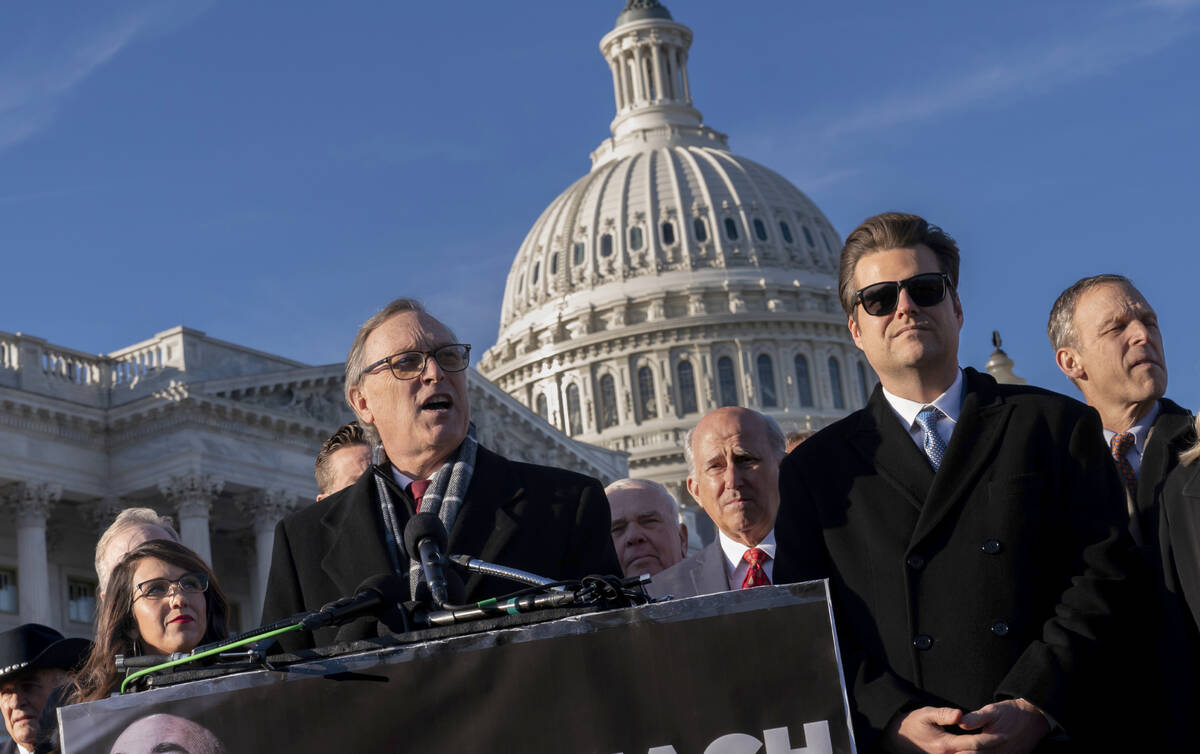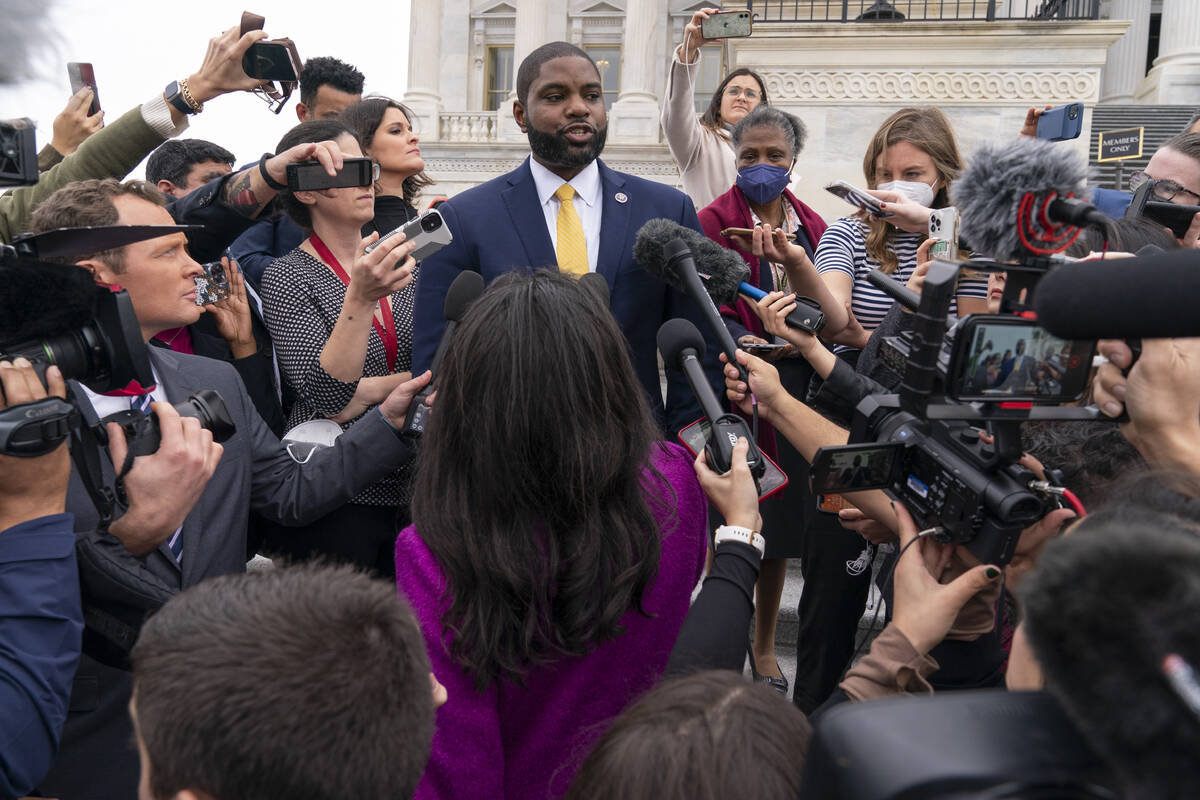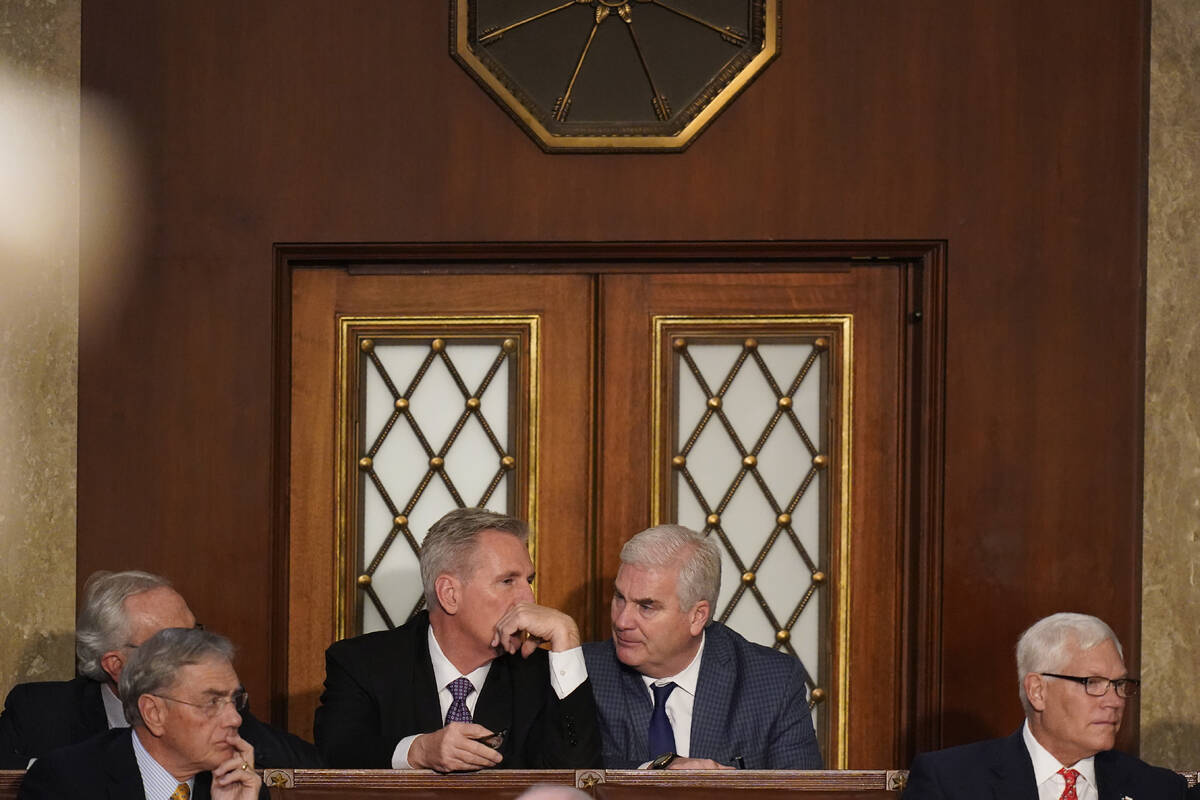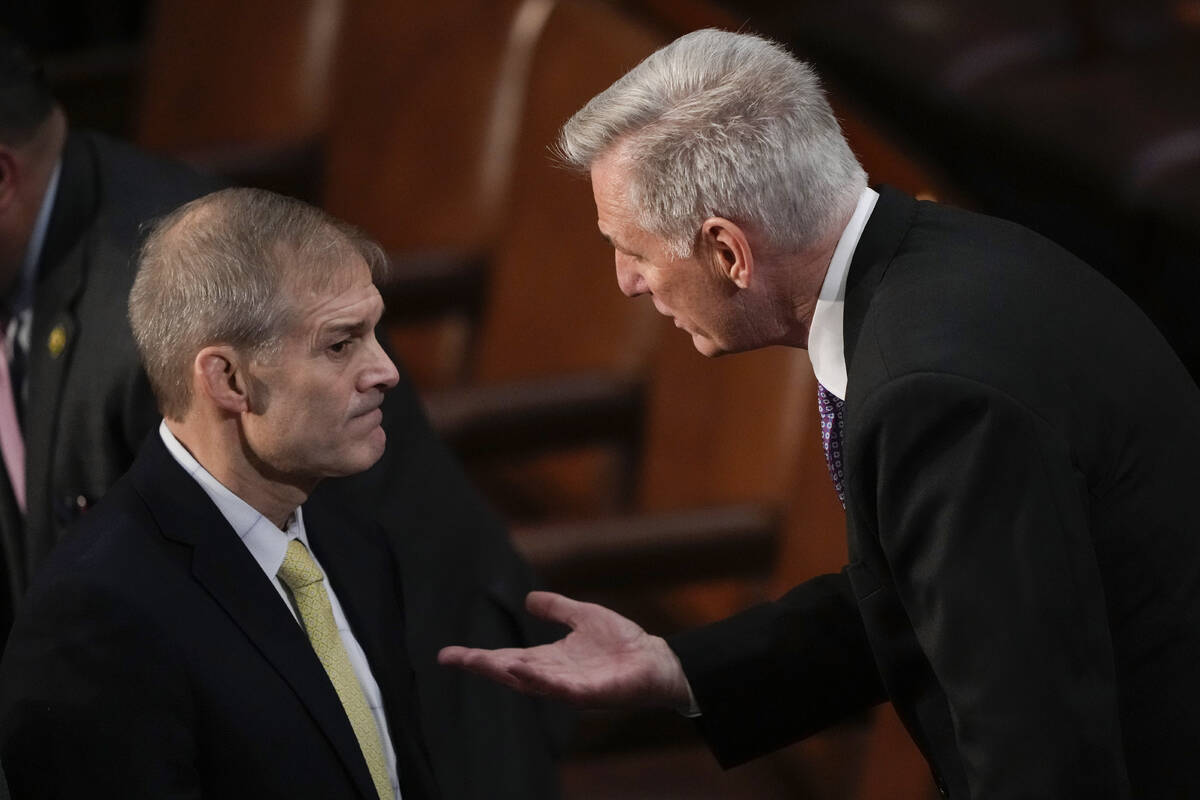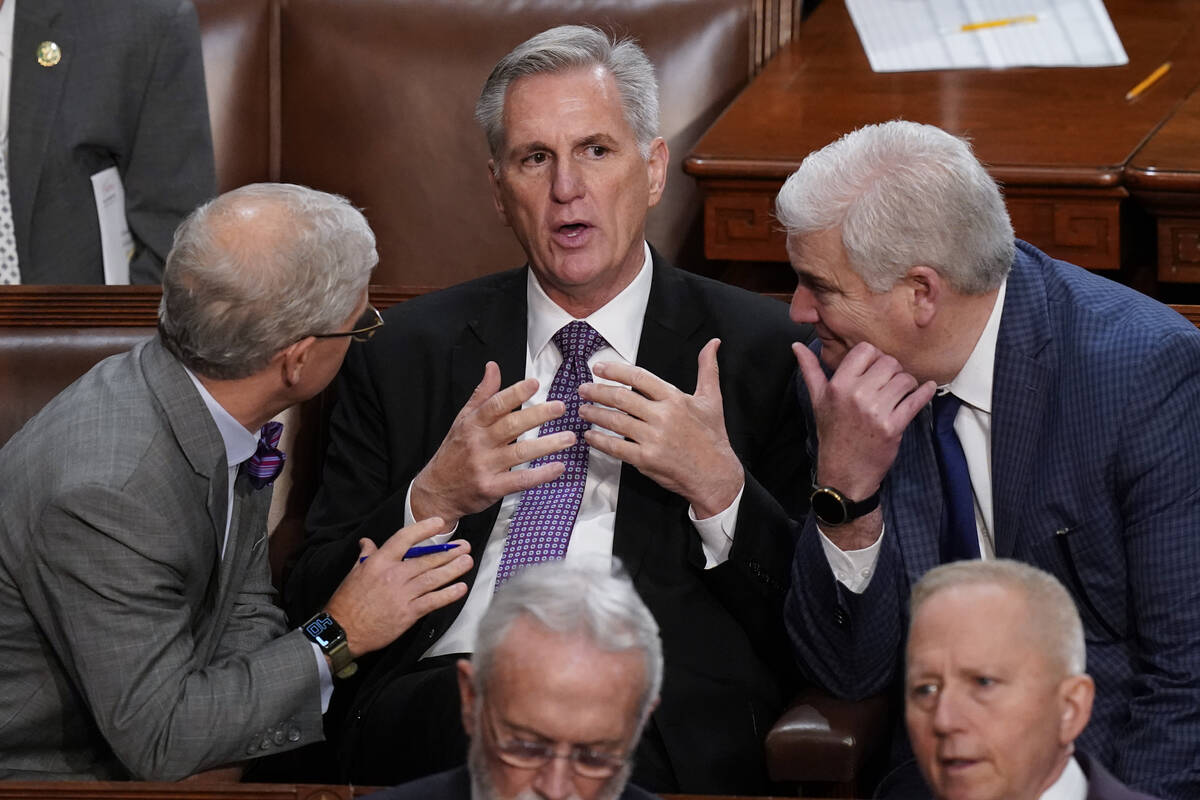Still the same: McCarthy fails in 10th try at speaker
WASHINGTON — For a long and frustrating third day, divided Republicans left the speaker’s chair of the U.S. House sitting empty Thursday, as party leader Kevin McCarthy failed again and again in an excruciating string of ballots to win enough GOP votes to seize the chamber’s gavel.
Pressure was building as McCarthy lost seventh, eighth and then historic ninth and 10th rounds of voting, surpassing the number it took the last time this happened, 100 years ago, in a prolonged fight to choose a speaker in a disputed election.
With McCarthy’s supporters and foes locked in stalemate, feelings of boredom and desperation seemed increasingly evident with no quick end in sight.
One McCarthy critic, Rep. Matt Gaetz of Florida, cast votes in two rounds for Donald Trump, a symbolic but pointed sign of the broader divisions over the Republican Party’s future.
“It’s not happening,” said Rep. Lauren Boebert of Colorado who nominated a new alternative, Kevin Hern of Oklahoma, and urged fellow Republicans to embrace a future without McCarthy: “We need a leader who is not of the broken system.”
McCarthy could be seen talking, one on one, in whispered and animated conversations in the House chamber. His emissaries sidled up to holdouts, and grueling negotiations proceeded in the GOP whip’s office down the hall. McCarthy remained determined to persuade Republicans to end the paralyzing debate that has blighted his new GOP majority.
McCarthy’s leadership team had presented a core group of the Republican holdouts with a deal on paper in exchange for their support, said one of the opponents, conservative Republican Ralph Norman of South Carolina, as he exited a late-day meeting. But details were scarce.
“We’re having good discussions and I think everyone wants to find a solution,” McCarthy told reporters hours earlier.
The House, which is one-half of Congress, is essentially at a standstill, unable to launch the new session, swear in elected members and conduct official business.
Yet, despite endless talks, signs of concessions and a public spectacle unlike any other in recent political memory, the path ahead remained highly uncertain. What started as a political novelty, the first time since 1923 a nominee had not won the gavel on the first vote, has devolved into a bitter Republican Party feud and deepening potential crisis.
Democrat Hakeem Jeffries of New York was re-nominated by Democrats. He won the most votes on every ballot but also remained short of a majority. McCarthy ran second, gaining no ground.
McCarthy resisted under growing pressure to somehow find the votes he needed or step aside so the House could open fully and get on with the business of governing.
The incoming Republican chairmen of the House’s Foreign Affairs, Armed Services and Intelligence committees all said national security was at risk.
“The Biden administration is going unchecked and there is no oversight of the White House,” Republicans Michael McCaul, Mike Rogers and Mike Turner wrote in a joint statement. “We cannot let personal politics place the safety and security of the United States at risk.”
But McCarthy’s right-flank detractors appeared intent on waiting him out, as long as it takes.
Rep. Scott Perry, R-Pa., the leader of the Freedom Caucus, asserted that McCarthy cannot be trusted, and tweeted his displeasure that negotiations over rule changes and other concessions were being made public.
“When confidences are betrayed and leaks are directed, it’s even more difficult to trust,” he tweeted.
Republican Party holdouts repeatedly put forward the name of Rep. Byron Donalds of Florida, assuring the stalemate that increasingly carried undercurrents of race and politics would continue.
Donalds, who is Black, is seen as an emerging party leader and GOP counterpoint to the Democratic leader, Jeffries, who is the first Black leader of a major political party in the U.S. Congress and on track himself to become speaker some day.
Another Black Republican, newly elected John James, nominated McCarthy on the seventh ballot as nominators became a roll call of the GOP’s rising stars. Brian Mast of Florida, a veteran, appeared to wipe away a tear as he nominated McCarthy on the eighth, and insisted the California Republican was not like past GOP speakers who are derided by conservatives. For the ninth ballot, a member of the conservative Freedom Caucus, Troy Nehls of Texas, made the nomination. For the 10th it was newly elected Juan Ciscomani of Arizona, an immigrant from Mexico whose speech drew chants of “USA! USA!”
“This battle we are waging must end,” Nehls told his colleagues.
A new generation of conservative Republicans, many aligned with Trump’s Make America Great Again agenda, want to upend business as usual in Washington, and were committed to stopping McCarthy’s rise without concessions to their priorities.
To win support, McCarthy has already agreed to many of the demands of his opponents.
Holdouts led by the chamber’s Freedom Caucus are seeking ways to shrink the power of the speaker’s office and give rank-and-file lawmakers more influence — with seats on key committees and the ability to draft and amend bills in a more free-for-all process.
One of their key asks is to reinstate a rule that would allow a single lawmaker to seek a motion to vacate the chair — essentially to call a House vote to oust the speaker. It’s the same rule a previous era of tea party Republicans used to threaten the removal of Boehner, and McCarthy has resisted reinstating it.
But those opposing McCarthy do not all have the same complaints, and he may never be able to win over some of them. A small core group of Republicans appear unwilling to ever vote for McCarthy.
“I’m ready to vote all night, all week, all month and never for that person,” said Florida Republican Gaetz.
Ballots so far have produced almost the same outcome, 20 conservative holdouts still refusing to support McCarthy and leaving him far short of the 218 typically needed to win the gavel.
In fact, McCarthy saw his support slipping to 201, as one fellow Republican switched to vote simply present, and later to 200. With just a 222-seat GOP majority, he could not spare detractors.
Thursday was a third long day. The new Republican majority was not expected to be in session on Friday, which is the anniversary of the Jan. 6, 2021, attack on the Capitol. A prolonged and divisive speaker’s fight would almost certainly underscore the fragility of American democracy after the attempted insurrection two years ago.
“We must open the House and proceed with the people’s work,” California Democrat Nancy Pelosi, the former speaker, said in a tweet.
Some Republicans appeared to be growing increasingly uneasy with the way the party has taken charge after the midterm elections only to see the chamber upended over the speaker’s race in their first days in the new majority.
Colorado Republican Ken Buck voted for McCarthy but said Wednesday that he told him “he needs to figure out how to make a deal to move forward” or eventually step aside for someone else.
The right-flank conservatives, led by the Freedom Caucus and aligned with former President Trump, appeared emboldened by the standoff — even though Trump publicly backed McCarthy.
The disorganized start to the new Congress pointed to difficulties ahead with Republicans now in control of the House, much the way that some past Republican speakers, including John Boehner, had trouble leading a rebellious right flank. The result: government shutdowns, standoffs and Boehner’s early retirement.
The longest fight for the gavel started in late 1855 and dragged on for two months, with 133 ballots, during debates over slavery in the run-up to the Civil War.
AP writers Mary Clare Jalonick and Kevin Freking contributed to this report.



